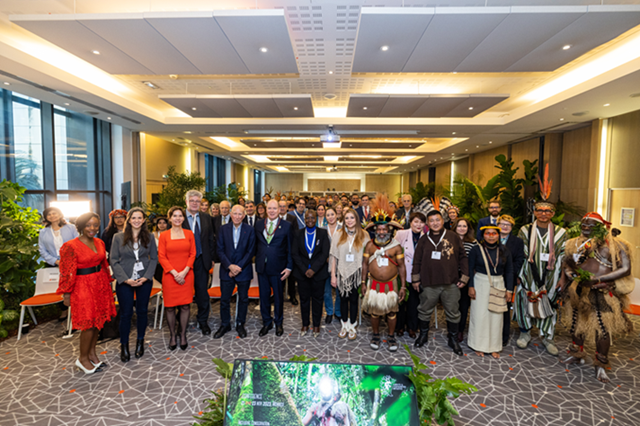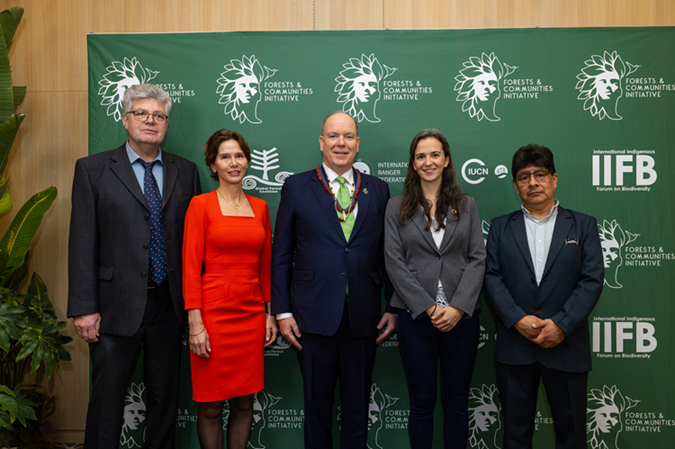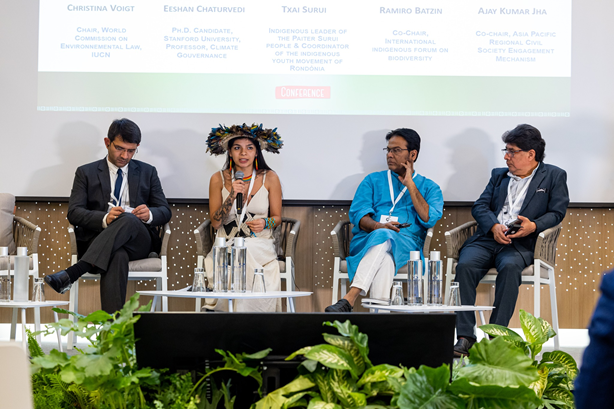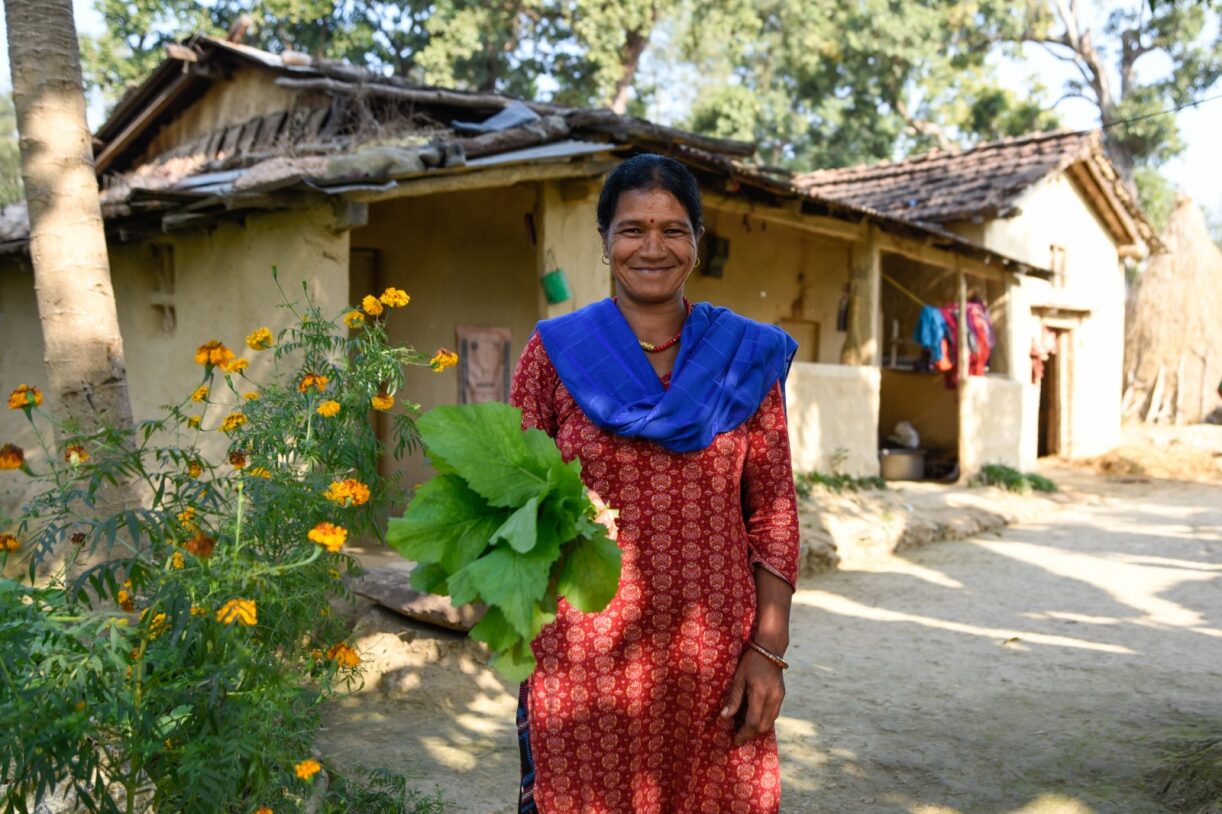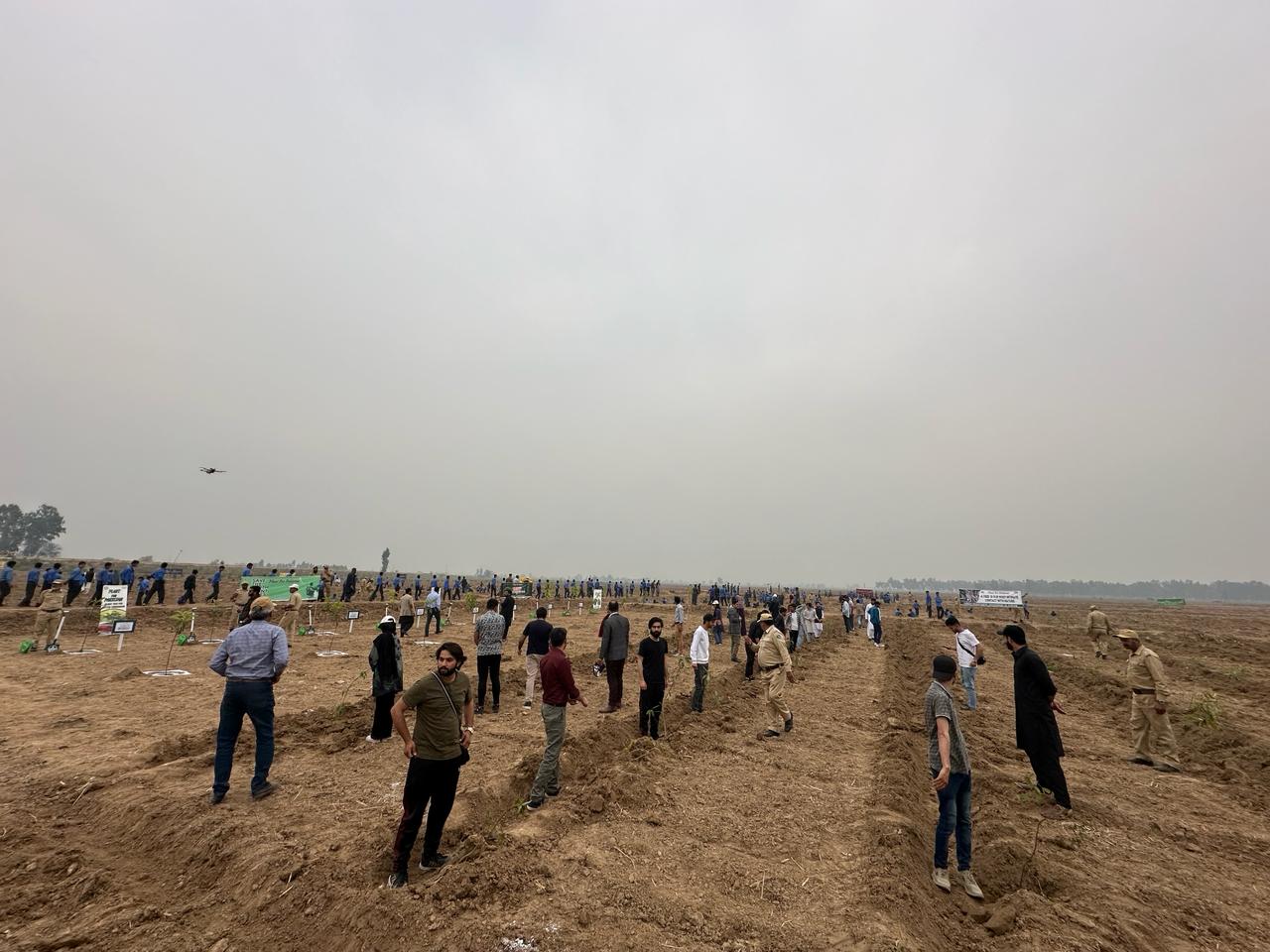IUCN WCEL co-hosts the first FCI conference “Inclusive Conservation: Indigenous Peoples and local communities at the forefront of forest protection”
The conference took place between 22 and 23 November 2023 in Monaco and highlighted the important role of robust, transparent, and inclusive forest governance.
The IUCN World Commission on Environmental Law (IUCN WCEL), working together with the Prince Albert II of Monaco Foundation, the International Ranger Federation, the Global Forest Coalition (GFC), and the International Indigenous Forum on Biodiversity (IIFB), hosted the event titled “Inclusive conservation: indigenous peoples and local communities at the forefront of the forest protection” between 22 and 23 November 2023 in Monaco. This was the first conference of the Forests and Communities Initiative, which had been established earlier in 2023 to support the conservation of forest ecosystems through the action of local communities and Indigenous Peoples and the development of a supportive network of actors.
The conference brought together over one hundred participants from various stakeholder groups, including the five forest defenders who had shared their stories in the documentary series “Gardiens de la Forêt” (Guardians of the Forest). The series was co-produced by ARTE and Lato Sensu Productions and premiered on 21 November 2023 in a pre-event ceremony that sent a clear message on the crucial role of Indigenous Peoples in protecting and restoring forests around the globe.
The conference programme included three discussion panels in addition to six fireside chats with Mr. Sebastião Salgado, Photographer at Studio Salgado, Mr. Benki Piyãko Asháninka, President of the Yorenka Tasorentsi Institute, Ms. Nemonte Nenquimo Waorani, Founder of Amazon Frontlines, Mr. Carlos Nobre, Co-Chair of the Science Panel for the Amazon, Ms. Juliette Biao Koudénoukpo, Director of the United Nations Forum on Forests Secretariat, and Mr. Tasso Azevedo, General Coordinator of MapBiomas.
On the first day (22 November 2023), IUCN WCEL hosted a panel on the use of environmental law in forest conservation. The key three takeaway messages from the session were:
- Environmental rule of law and robust and inclusive governance are crucial for the protection of forests. Environmental laws need to recognize the integrity of ecosystems, including the rights of Indigenous People and other stakeholders who live in harmony with(in) forests.
- There are drivers of deforestation that lie beyond the environmental sphere, such as agriculture and trade. Therefore, it is imperative to look beyond international and national environmental law and foster complementarities and synergies with other fields of law, such as human rights law.
- Laws cannot remain just words on paper. National environmental laws need to be properly implemented and enforced, always taking into consideration the rights of Indigenous Peoples and through active consultation. Making the rights laws and promoting effective implementation all the way to enforcement is paramount.
More specifically, the session provided an opportunity for representatives of different stakeholder groups to share their views on the use of law in protecting, restoring, and conserving forests:
- Ms. Christina Voigt, Chair of IUCN WCEL, welcomed participants and facilitated the discussion. Christina introduced the panel by highlighting the role of law and governance in ensuring that environmental policies are long-lasting and sustainable as well as protect those who are on the frontlines. She underscored the instrumental role that legal tools could play in protecting forests, restoring degraded land, and expanding forest cover while safeguarding the procedural and substantive rights of Indigenous Peoples and other stakeholders.
- Justice Antonio Benjamin (virtually), Member of the National High Court of Brazil and Chair Emeritus of IUCN WCEL, explained how the protection of forests fitted under the umbrella of international environmental law. Justice Antonio noted that protecting forests predated environmental law. He underscored that forest law was not working well globally for many reasons, including the lack of harmony between national forest laws and the protection of Indigenous Peoples. Justice Antonio introduced the Model Forest Act Initiative (Mo-FAI), co-led by IUCN WCEL, which aimed to inform the drafting and updating of forest legislation globally.
- Mr. Eeshan Chaturvedi, Ph.D. Candidate at Stanford University and Professor of Climate Governance, spoke on the effectiveness of environmental laws in the protection of rights of local communities and Indigenous Peoples in forest conservation. Eeshan noted that access to information, public consultation, and access to justice were three building blocks of international and national environmental and forest law. He also stated that law was about decision-making on an everyday basis and protecting the rights of those who were affected first and worst. Eeshan called attention to the implementation gap and noted that all legal discussions needed to include every single part of society through broad, inclusive consultation.
- Mr. Ajay Kumar Jha, Co-chair of the Asia Pacific Regional Civil Society Engagement Mechanism, discussed how laws could be better designed for sustainable forest management without compromising the integrity of ecosystems. Ajay underscored that over one hundred and sixty countries had forest laws and recognized the right to a clean, healthy, and sustainable environment. Despite that, deforestation rates continued to be on the rise. He stressed that conservation laws had become primarily based on economic considerations (i.e., determining the extent to which resources can be used and harvested). Furthermore, many conservation laws had a clear colonial legacy and were designed to protect forests because of their economic value, regardless of the rights of those who live in them. In many countries, environmental laws were being weakened and exempting corporate actors from liability and responsibility, and that needed to be addressed. Ajay underscored that the involvement of local communities and Indigenous Peoples was crucial for forest conservation.
- Ms. Txai Suruí, Indigenous Youth Activist, spoke on the need to strengthen the legal protection of Indigenous Peoples. Txai provided examples of ways in which the rights of Indigenous People were threatened on a daily basis in Brazil and abroad, including by parliaments that often legislated against Indigenous Peoples’ rights and in favor of interests from economic sectors such as agriculture. She further called attention to the drivers of deforestation and challenges in the context of global supply chains. For instance, food that was produced against Indigenous rights in Brazil ended up in the European market. Consumption of such food empowered big agriculture players to continue lobbying for weakened environmental legislation and pursuing illegal action in protected lands in Brazil. Txai concluded by noting that stronger legislation at the national and international level was needed, including to prevent countries from buying food derived from Indigenous Peoples’ rights violations.
- Mr. Ramiro Batzin, Co-Chair of the International Indigenous Forum on Biodiversity, concluded the session by addressing how environmental law supported the conservation of forests. Ramiro highlighted that many countries had laws that were not adequate for the conservation of forests and often did not recognize the rights and governance structures of Indigenous Peoples. However, at the international level, key environmental instruments had been recognizing these important rights. For instance, the Kunming-Montreal Global Biodiversity Framework included eight targets that considered the relevant contribution of Indigenous People to biodiversity conservation. Ramiro concluded by stressing that, at the national level, there was a difference between the law, who applied the law, and how the law was interpreted. He called attention to the fact that conservation law was often used against Indigenous Peoples.
On the second day (23 November 2023), conference participants joined a workshop to discuss priorities and recommendations. This lively exchange took place in three different working groups, one chaired by IUCN WCEL member Eeshan Chaturvedi. The Commission was also represented in the discussions by Mr. Roberto Coll, IUCN WCEL Executive Officer, and Ms. Marina Venâncio, IUCN WCEL Steering Committee Member. The outcomes of the workshop informed the development of a participatory call to action by the organizers. The message was clear: we need to hear the voices of the people who are at the forefront of biodiversity conservation. Among other things, the call highlighted the importance of improving coherence between national laws and legally binding international instruments pertaining to forest protection and Indigenous Peoples’ rights, as well as of promoting efforts to develop and share guidance on forest conservation, such as the Model Forest Act Initiative.
When available, the call to action will be posted on the Forests and Communities Initiative website.
Caption: Delegation from the IUCN World Commission on Environmental Law.
Caption: Presentation from Justice Antonio, Chair Emeritus of the IUCN World Commission on Environmental Law.
Further reading:
- About the Forests and Communities Initiative (FCI): https://www.forestsandcommunitiesinitiative.org/en/who-are-we-41
- About the IUCN WCEL Model Forest Act Task Force:
https://www.iucn.org/our-union/commissions/group/iucn-wcel-model-forest-act-task-force
